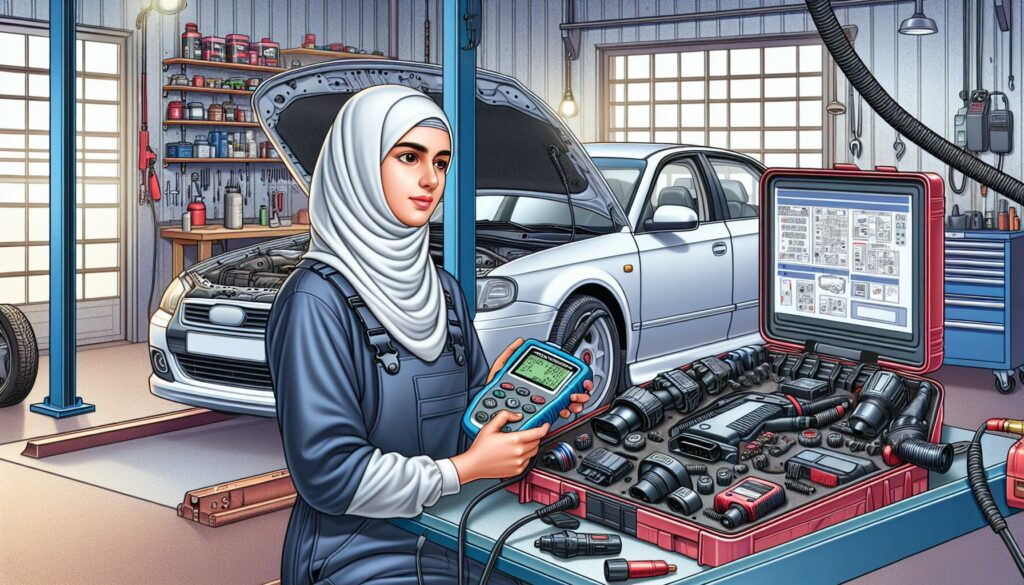Ever wonder what’s under the hood of your car? I’m not talking about the engine or the battery, but the tech that mechanics use to diagnose your vehicle. One tool you’ll find in every professional’s toolkit is an OBD scanner.
OBD scanners, or On-Board Diagnostics scanners, are essential for modern auto mechanics. They’re the magic wand that reveals what’s really going on inside your car’s brain. But not all OBD scanners are created equal.
So, what kind of OBD scanner do pros use? Let’s dive in and find out. Stay tuned as I break down the top OBD scanners that mechanics swear by. You might even pick up a few tips for your own garage.
What is an OBD Scanner?
Before delving into the types of OBD scanners mechanics use, it’s crucial to understand what an OBD scanner is and why it’s so significant. An ‘On-Board Diagnostic’ (OBD) scanner is an automotive tool built to diagnose and provide valuable information about a vehicle’s system.
Traditionally, determining what was wrong with a vehicle was a guess-and-check procedure. Mechanics had to depend on experience and instinct to pinpoint issues, often having to dismantle sections before identifying the actual problem. However, OBD scanners have revolutionized this process, facilitating swift, accurate troubleshooting by delivering real-time updates and alerts on various vehicle systems.
So how does an OBD scanner work? Quite simply, it communicates with the computerized components of a vehicle, reading diagnostic trouble codes (DTCs) stored within. Once a connection is established, the scanner retrieves these codes, each identifying specific issues within the vehicle. This process eliminates guesswork, helping mechanics accurately diagnose problems and repair them effectively.
There are multiple OBD scanner types. Basic scanners merely read and clear codes, while more advanced models offer additional features. The latter category can provide live data, run system tests, provide maintenance reminders, and display a vehicle’s data graphically for easy understanding.
Delving further, there are two main versions of OBDs: OBD1 and OBD2. OBD1 systems were the initial introduction, present in vehicles from 1981 to 1995. These systems vary immensely from one another, making servicing diverse auto makes and models a bit challenging. However, in 1996 OBD2 was introduced to standardize the process. Most modern vehicles are equipped with OBD2 systems, simplifying the diagnostic process for mechanics considerably.
In essence, an OBD scanner is a potent tool for a mechanic, essential for swiftly identifying and resolving issues within a vehicle’s system efficiently. It narrows down the problematic areas, eliminating the traditional guess-and-check methods of yore. Let’s now take a look at some popular OBD scanner models that professional mechanics prefer to use.
We’re not ending here. Stay tuned for the next section about the ‘Types of OBD Scanners’.
Importance of OBD Scanners for Mechanics
For a mechanic, having the right tools is as essential as having the necessary skills. But among all the tools in their arsenal, an OBD Scanner stands out as a game changer. This small yet robust device simplifies their job tremendously, leading to quicker diagnoses and more efficient services.
So what makes an OBD scanner such a critical apparatus? To begin, it provides a direct line to the vehicle’s onboard diagnostic system. Whenever there’s a problem, the vehicle doesn’t mysteriously break down or behave unpredictably. Instead, it communicates the issue via its internal computer system. But without an OBD scanner, translating these signals into comprehensible information can be a challenge.
Enter the OBD scanner. It acts as a translator, decoding complicated error signals into straightforward diagnostic trouble codes (DTCs). These DTCs allow mechanics to pinpoint the exact problem, which can range from a simple spark plug fault to a complicated engine malfunction. Simply by connecting the OBD scanner to the vehicle’s OBD port, they can gain a comprehensive real-time overview of the vehicle’s performance.
Moreover, there’s no need for tedious guesswork or manual diagnostics. A mechanic can rely on the live data these devices offer, aiding in making informed decisions concerning maintenance and repairs. By cutting down on time-consuming guesswork and promoting precise diagnostics, OBD scanners substantially increase workshop productivity and service quality.
It’s also worth noting that OBD scanners come in a variety of types, with different characteristics and functionalities. From basic code readers to advanced diagnostic tools capable of detailed system tests, these devices cater to the varied needs of mechanics.
The unmatched utility and versatility of OBD scanners make them integral to modern automotive diagnosis and repair. By empowering mechanics with precise diagnostics and real-time updates, these powerful devices directly contribute to enhanced automotive health and customer satisfaction. Surely, it’s hard to imagine a world of mechanics without the invaluable support of OBD scanners.
Factors to Consider When Choosing an OBD Scanner
As a seasoned mechanic, I’ve learned that not all OBD scanners are created equal. Selecting the right device for your garage requires consideration of several key factors. Here, I’m laying out the essential details that’ll lead you to your ideal match.
First thing’s first – decide on the type of scanner. OBD scanners come in basic code readers and advanced diagnostic tools. While basic code readers can display DTCs, they often lack comprehensive features such as live data viewing and advanced diagnostic checks. Advanced diagnostic tools, on the other hand, provide a more detailed overview and can troubleshoot a wider range of issues. Hence, understanding your needs and what each type delivers will help when making this decision.
Next is the aspect of compatibility. You’d want to choose an OBD scanner that’s compatible with the make, model, and year of the vehicles you’re frequently servicing. Some scanners work best with certain brands, while others are more universal. Therefore, knowing the vehicles’ specifications is critical for choosing an OBD scanner that’ll prove most beneficial.
Usability remains another crucial point. An OBD scanner that’s user-friendly can save you loads of time and frustration. A tool with a clear, easy-to-read display, intuitive interface, and instructions in your language makes the diagnosis process more seamless.
Lastly, factor in the cost. These gadgets vary to a great extent when it comes to pricing. Calculating your budget against the value you’ll get is an important calculation. Don’t be fooled into thinking that a higher cost equates to a better device. You might find a mid-range scanner that ticks all your boxes without breaking your budget.
Keep these considerations in mind as you search for an OBD scanner. Remember, the goal is to find a gadget that will make your diagnostic process more accurate, efficient, and ultimately, improve overall productivity in your workshop.
Top OBD Scanners Recommended by Professionals
What OBD scanner do mechanics use? There’s certainly no one-size-fits-all answer to this query. Professionals across the industry have differing favorites based on their specific needs, the vehicles they service, and so forth. That being said, there are a few standout options that come highly recommended.
Autel MaxiCOM MK808 is widely acclaimed for its advanced diagnostics and wide vehicle compatibility. Its features include reading and clearing codes, live data viewing, and advanced services like BMS, DPF, SAS and more. It’s compatible with most 1996 US-based, 2000 EU-based and newer vehicles.
Next up is the FOXWELL NT301 OBD2 Scanner Professional Mechanic OBDII Diagnostic Code Reader Tool. It’s lauded for its ability to accurately determine the cause of the engine light, turn off the “Check Engine Light”, erase codes, and reset monitors. This device is equipped with a large TFT color screen and life-time free software updates.
Finally, the Launch X431 Creader VII+ (CRP123) Auto Code Reader EOBD is a top choice. It’s crafted to offer comprehensive diagnostic functions including reading and erasing codes, viewing and graphing live data stream, performing modules present test, etc. Compatible with a wide range of vehicles and carrying a full manufacturer specific code definitions- look no further.
| OBD Scanner | Key Features |
|---|---|
| Autel MaxiCOM MK808 | Advanced diagnostics, wide vehicle compatibility |
| Foxwell NT301 | Determine cause of engine light, large TFT color screen |
| Launch X431 Creader VII+ | Comprehensive diagnostic functions, manufacturer specific code definitions |
Even with these high performing scanners, it’s paramount to remember that no tool can substitute professional judgment and expertise. When selecting the right OBD scanner, your personal workshop needs and the specific vehicle requirements should always take precedence. Therefore, continual research, experiments with multiple tools, and even peer consultation might be necessary.
Conclusion
So there you have it. The Autel MaxiCOM MK808, FOXWELL NT301, and Launch X431 Creader VII+ stand out as top OBD scanners for mechanics. They’re favored for their advanced diagnostics and broad vehicle compatibility. But remember, it’s not just about the tool. It’s about understanding your workshop’s needs and the vehicles you’re dealing with. Ongoing research, testing different scanners, and consulting with peers are all part of the selection process. So, don’t hesitate to keep exploring and learning. After all, the right OBD scanner can make a world of difference in your work as a mechanic.
1. What is the main topic of the article?
The article primarily discusses the top OBD scanners recommended by professionals in the automotive industry, including models like Autel MaxiCOM MK808, FOXWELL NT301, and Launch X431 Creader VII+.
2. What features do the recommended OBD scanners offer?
The highlighted OBD scanners offer advanced diagnostics, comprehensive diagnostic functions, wide vehicle compatibility, and capabilities for reading and clearing codes, plus live data viewing.
3. How important is professional judgment in choosing an OBD scanner?
Professional judgment is emphasized as crucial in selecting the right OBD scanner. Understanding the workshop needs and vehicle requirements is necessary to make the best choice.
4. What steps should one take in choosing an OBD scanner?
The article suggests ongoing research, experimentation with different tools, and consulting with peers in the industry as necessary steps in the process of choosing an OBD scanner.
5. Are these scanners compatible with all vehicles?
The article mentions that the scanners have wide vehicle compatibility but does not specify if they work with all vehicles. It would be best to check each scanner’s specifications for detailed compatibility information.

